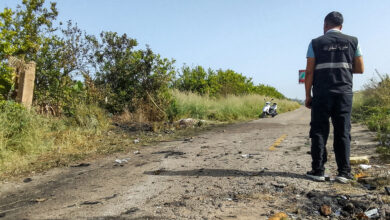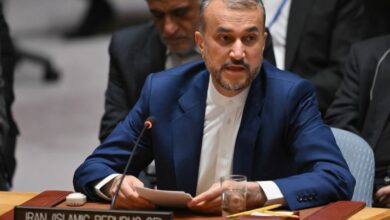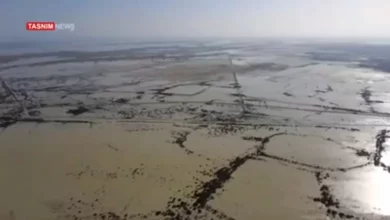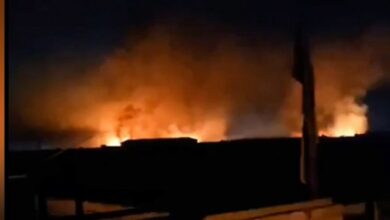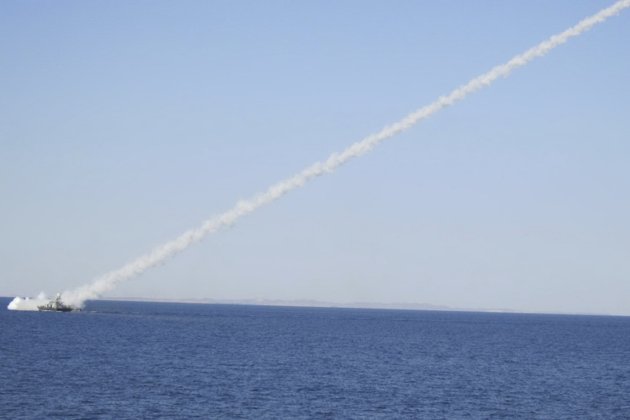
ANKARA — Iran's foreign minister warned neighboring states not to put themselves in a "dangerous position" by aligning themselves too closely with the United States in the escalating dispute over Tehran's nuclear activity.
Confrontation is brewing over Tehran's nuclear work, which Washington and other powers say is focused on developing atomic weapons. Iran dismisses the accusation.
Iran has threatened to close the Strait of Hormuz, used for a third of the world's seaborne oil trade, if pending Western moves to ban Iranian crude exports cripple its lifeblood energy sector, fanning fears of a slide into wider Middle East war.
European Union foreign ministers are expected at a meeting on Monday to agree an oil embargo against Iran and a freeze on the assets of its Central Bank, French Foreign Minister Alain Juppe said, confirming diplomatic leaks.
Saudi Arabia, the world's top oil exporter, riled Iran earlier this week when it said it could swiftly raise oil output for key customers if needed, a scenario that could transpire if Iranian exports were embargoed.
Industry sources told Reuters on Thursday Turkish refiner Tupras also planned to cut its dependence on imports of Iranian oil, partly in response to the Hormuz threat.
"We want peace and tranquility in the region. But some of the countries in our region, they want to direct other countries 12,000 miles away from this region," Iranian Foreign Minister Ali Akbar Salehi said in English during a visit to Turkey on Thursday, before the news emerged about Tupras.
The remark was an apparent reference to the alliance of Iran's Arab neighbors with Washington, which maintains a big naval force in the Gulf and says it will keep the waterway open.
"I am calling to all countries in the region, please don't let yourselves be dragged into a dangerous position," Salehi told Turkey's NTV broadcaster.
He added the United States should make clear that it was open for negotiations with Tehran without conditions. He referred to a letter Iran says it received from President Barack Obama about the situation in the Strait of Hormuz, the contents of which have not been made public.
The White House has refused to comment on the letter.
"Mr. Obama sent a letter to Iranian officials, but America has to make clear that it has good intentions and should express that it's ready for talks without conditions," he said.
"Out in the open they show their muscles but behind the curtains they plead to us to sit down and talk. America has to pursue a safe and honest strategy so we can get the notion that America this time is serious and ready."
The United States, like other Western countries, says it is prepared to talk to Iran but only if Tehran agrees to discuss halting its enrichment of uranium. Western officials say Iran has been asking for talks "without conditions" as a stalling tactic while refusing to put its nuclear program on the table.
IAEA fears
The International Atomic Energy Agency chief said it was his duty to alert the world about possible military aspects to Iran's nuclear campaign, keeping the heat on Tehran ahead of a rare visit by senior IAEA officials for talks on 29–31 January.
"What we know suggests the development of nuclear weapons," the head of the UN agency was quoted as saying by Financial Times Deutschland on Thursday. "We want to check over everything that could have a military dimension."
An IAEA delegation, to be headed by Deputy Director General Herman Nackaerts, is expected to seek explanations for intelligence information indicating Iran has engaged in research and development applicable to nuclear weapons.
Tehran says it is refining uranium only for electricity generation and medical applications.
Salehi said on Wednesday that Iran, the world's fifth biggest oil exporter, was in touch with world powers to reopen talks that he expected to be held soon.
Washington and the EU quickly denied this, saying they are still waiting for Iran to show it wanted serious negotiations addressing fears that it is trying to build atom bombs.
Turkish Foreign Minister Ahmet Davutoglu said after meeting Salehi that all sides were willing to resume talks but the time and place need to be settled. "I will tell Ms. Ashton about the talks today," he told reporters, referring to the EU foreign policy chief who represents world powers trying to engage with Iran.
"We have always said we are ready for dialogue," France's Juppe told reporters in Paris. "Ashton has made concrete offers, but sadly until today Iran has not committed transparently or cooperatively to this discussion process."
He added: "It's for this reason that to avoid an irreparable military option we have to strengthen sanctions."
Stage set for sanctions
The stage was set for international oil sanctions against Iran when Obama signed legislation on 31 December that would freeze out any institution dealing with Iran's central bank, making it impossible for most countries to buy Iranian crude.
Diplomats said the EU's 27 member states were still mulling details such as when an embargo would start. They were looking into a grace period that would end in July to help some debt-ridden EU states that rely on Iranian oil to adjust to a ban.
"On the central bank, things have been moving in the right direction," an EU diplomat said. "There is now wide agreement on the principle. Discussions continue on the details."
Turkey, which imports more than 30 percent of its daily consumption from Iran, has so far given no indication that it will comply with the planned EU embargo.
But an industry source said that Iranian threats to shut down the Strait of Hormuz had helped push Turkish oil officials to try to reduce the country's heavy dependence on Iran's oil.
Another of the sources said Tupras officials were planning to meet Saudi Arabian oil authorities this month, with a view to switching to alternative sources of crude by the summer.
Tupras declined to give an immediate comment.
Japanese Trade Minister Yukio Edano said on Friday he told visiting US officials that Japan's imports of Iranian crude had fallen 40 percent in the past five years, and the trend will continue.

